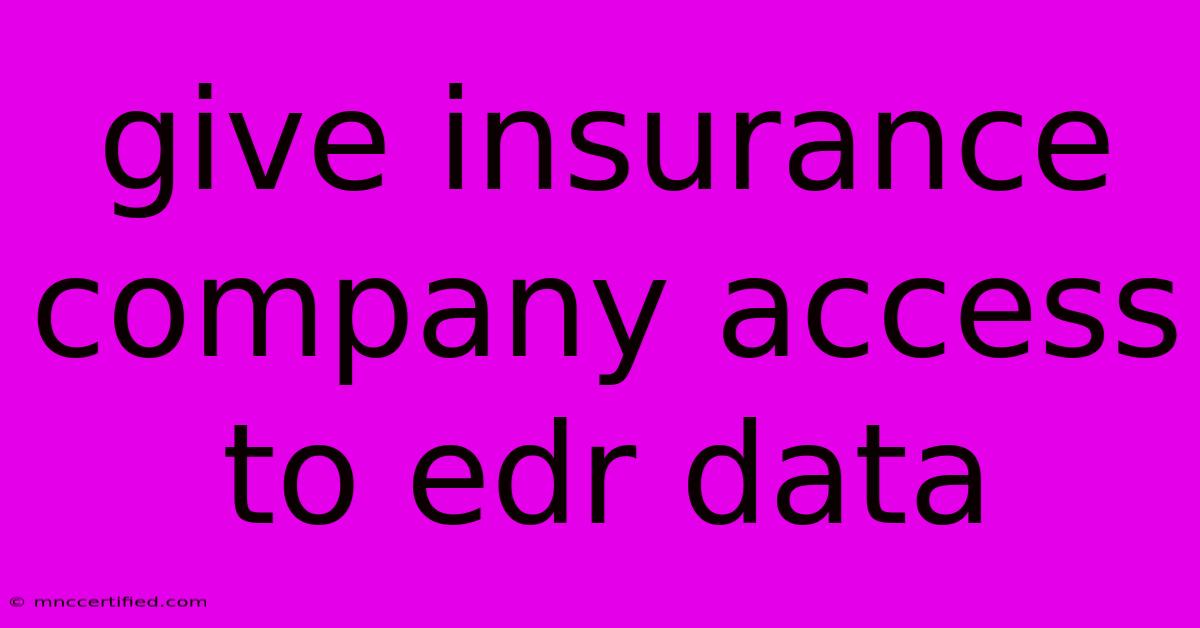Give Insurance Company Access To Edr Data

Table of Contents
Should You Give Your Insurance Company Access to Your EDR Data?
In the digital age, our cars are becoming increasingly connected. They generate vast amounts of data about how we drive, known as Event Data Recorder (EDR) data. This data can be invaluable in accident investigations, providing a detailed record of what happened leading up to a collision. However, the question of whether to give your insurance company access to this sensitive information is a complex one.
What is EDR Data?
EDR data is essentially a "black box" recording of your vehicle's systems during a crash. It captures information such as:
- Vehicle speed: How fast was your car going before, during, and after the incident?
- Braking activity: Was the brake pedal pressed? How hard and for how long?
- Steering wheel angle: Was the vehicle swerving before the collision?
- Engine speed: How fast was the engine running?
- Seatbelt usage: Were seatbelts engaged at the time of the accident?
This information can be crucial in determining the cause of an accident and establishing liability.
The Benefits of Sharing EDR Data
There are several potential benefits to giving your insurance company access to your EDR data:
- Faster and fairer claims processing: EDR data can provide objective evidence to support your claim, leading to quicker and more accurate processing of your insurance claim.
- Reduced premiums: Some insurance companies offer discounts for drivers who allow access to their EDR data, as it can help them assess risk more accurately.
- Improved safety: Insurance companies can use this data to identify and address driving patterns that may lead to accidents, improving overall road safety.
The Risks of Sharing EDR Data
While there are benefits, there are also risks associated with sharing your EDR data:
- Privacy concerns: The data collected by EDR systems can be quite personal, revealing details about your driving habits and potentially your location. It's important to understand how your insurer will use this data and whether it will be shared with third parties.
- Potential misuse: There's a risk that your insurer could use the data against you, for example, by raising your premiums if they find evidence of risky driving behaviors.
- Data breaches: Like any sensitive data, EDR data can be vulnerable to cyberattacks and breaches, putting your privacy at risk.
Making an Informed Decision
Ultimately, the decision of whether to give your insurance company access to your EDR data is a personal one. Here are some factors to consider:
- Your insurance policy: Carefully review your policy to understand the insurer's data access policy and any associated benefits or penalties.
- Your privacy concerns: Do you feel comfortable sharing this personal data with your insurance company?
- Your driving habits: If you have a history of safe driving, you might feel less concerned about potential misuse of the data.
- Alternatives: If you are uncomfortable with sharing your EDR data, consider exploring other insurance options that may not require access to this information.
Conclusion
Giving your insurance company access to your EDR data can have both benefits and risks. It's crucial to weigh these factors carefully and make an informed decision based on your personal circumstances and comfort level with data sharing. Remember to prioritize your privacy and carefully review your insurance policy before making a decision.

Thank you for visiting our website wich cover about Give Insurance Company Access To Edr Data. We hope the information provided has been useful to you. Feel free to contact us if you have any questions or need further assistance. See you next time and dont miss to bookmark.
Featured Posts
-
S And P 500 Record Post Election Day Rally
Nov 07, 2024
-
Handmaids Tale 1984 Top Amazon Charts
Nov 07, 2024
-
Trumps Election Ukraine War Aid Concerns
Nov 07, 2024
-
Secret Bonds A Billionaires Untamed Love
Nov 07, 2024
-
Using Openreel Benefits Crypto Coinstrade
Nov 07, 2024